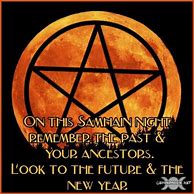Category: A Thought for Today
Merry meet dear Sisters, Brothers, and Honored Guests, Welcome to WOTC! A Thought for Today
If you want to see some information on any tradition of witchcraft, please put it in the comment section. I will try to find some information to post about it.
May your and your family’s lives be filled with all things positive!
Merry part until we merry meet again!
Merry meet dear Sisters, Brothers, and Honored Guests, welcome to WOTC! A Thought for Today
May 4th posts will be up later today. May 5th posts will be posted on that date as we are making a 500 mile round trip tomorrow to see one of my grandsons graduate with his bachelor degree on his way to becoming a doctor. So we are working about 8 – 9 hours today for Big Dawgs job.
If you want to see some information on any tradition of witchcraft, please put it in the comment section. I will try to find some information to post about it.
May your and your family’s lives be filled with all things positive!
Merry part until we merry meet again!
Happy Beltane to Our Northern Hemisphere WOTC Family! A Thought for Today

A Thought for Wednesday

After sitting at my desktop for 6 hours with small breaks doing May 1st and 2nd posts plus some of the monthly posts I’m sore and tired. I did this all so I can take Beltane off to celebrate to me the most important Wheel of the Year holiday and my birthday. I will not be available for anything tomorrow. May 1st posts will be reposted on May 2nd.
To Our Southern Hemisphere WOTC Family and Friends – Blessed Samhain A Thought for Today


As our ancestors and others who have crossed the veil may visit us this Samhain to help us welcome the beginning of the Wheel of the Year as it begins anew may you and yours have all you need this year to meet your needs, more positive energy come to you and positive events outweigh the negative ones!
Merry meet dear Sisters, Brothers, and Honored Guests, welcome to WOTC! A Thought for Today

As Mother Earth will be here long after we have entered the Summerland it is important that we at least try to undo some of the damage done to here in centuries past. This is the lasting legacy we can leave to our descendants. When you go for a walk or bike ride take along a trash bag and pick up after those who have disrespected our Monther. I taught this first to my children and now to my grandchildren. I hope my grandchildren pass it on to their children and them to theirs until the day my bloodline is no more somewhere in the very distant future.
If you want to see some information on any tradition of witchcraft, please put it in the comment section. I will try to find some information to post about it.
May your and your family’s lives be filled with all things positive!
Merry part until we merry meet again!
Merry meet dear Sisters, Brothers, and Honored Guests, welcome to WOTC! A Thought for Today
From poets.org
A Witch’s Chant
Thou art weary, weary, weary,
Thou art weary and far away,
Hear me, gentle spirit, hear me,
Come before the dawn of day.
I hear a small voice from the hill,
The vapour is deadly, pale, and still—
A murmuring sough is on the wood,
And the witching star is red as blood.
And in the cleft of heaven I scan
The giant form of a naked man,
His eye is like the burning brand,
And he holds a sword in his right hand.
All is not well. By dint of spell,
Somewhere between the heaven and hell
There is this night a wild deray,
The spirits have wander’d from their way.
The purple drops shall tinge the moon
As she wanders through the midnight noon;
And the dawning heaven shall all be red
With blood by guilty angels shed.
Be as it will, I have the skill
To work by good or work by ill;
Then here’s for pain, and here’s for thrall,
And here’s for conscience, worst of all.
Another chant, and then, and then,
Spirits shall come or Christian men—
Come from the earth, the air, or the sea,
Great Gil-Moules, I cry to thee!
Sleep’st thou, wakest thou, lord of the wind,
Mount thy steeds and gallop them blind;
And the long-tailed fiery dragon outfly
The rocket of heaven, the bomb of the sky.
Over the dog-star, over the wain,
Over the cloud, and the rainbow’s mane,
Over the mountain, and over the sea,
Haste—haste—haste to me!
Then here’s for trouble, and here’s for smart,
And here’s for the pang that seeks the heart;
Here’s for madness, and here’s for thrall,
And here’s for conscience, the worst of all!
If you want to see some information on any tradition of witchcraft, please put it in the comment section. I will try to find some information to post about it.
May your and your family’s lives be filled with all things positive!
Merry part until we merry meet again!
Merry meet dear Sisters, Brothers, and Honored Guests, welcome to WOTC! A Thought for Today
If you want to see some information on any tradition of witchcraft, please put it in the comment section. I will try to find some information to post about it.
May your and your family’s lives be filled with all things positive!
Blessed be!
Merry part until we merry meet again!
Merry meet dear Sisters, Brothers, and Honored Guests, welcome to WOTC! A Thought for Today

If you want to see some information on any tradition of witchcraft, please put it in the comment section. I will try to find some information to post about it.
May your and your family’s lives be filled with all things positive!
Blessed be!
Merry part until we merry meet again!
Merry meet dear Sisters, Brothers, and Honored Guests, welcome to WOTC! A Thought for Today
I need some help please. I run Windows 10 on my Dell desktop. This morning when I turned it on everything was huge! I do not know how it happened and do not want to mess it up more by trying to fix it without some guidance from someone more knowledgeable than myself. This size font is usually about half this size.
Anyone who can help me get it back to normal size I will happily do a 5-card tarot reading for as a thank you gift.
If you want to see some information on any tradition of witchcraft, please put it in the comment section. I will try to find some information to post about it.
May your and your family’s lives be filled with all things positive!
Blessed be!
Merry part until we merry meet again!
Merry meet dear Sisters, Brothers, and Honored Guests, welcome to WOTC! A Thought for Today

If you want to see some information on any tradition of witchcraft, please put it in the comment section. I will try to find some information to post about it.
May your and your family’s lives be filled with all things positive!
Blessed be!
Merry part until we merry meet again!
Merry meet dear Sisters, Brothers, and Honored Guests, welcome to WOTC! A Thought for Today
If you want to see some information on any tradition of witchcraft, please put it in the comment section. I will try to find some information to post about it.
May your and your family’s lives be filled with all things positive!
Blessed be!
Merry part until we merry meet again!
Merry meet dear Sisters, Brothers, and Honored Guests, welcome to WOTC! A Thought for Today
The tomorrow post will be up later today. Sorry, I overslept and Crystal has a vet appointment this morning.
If you want to see some information on any tradition of witchcraft, please put it in the comment section. I will try to find some information to post about it.
May your and your family’s lives be filled with all things positive!
Blessed be!
Merry part until we merry meet again!
Merry meet dear Sisters, Brothers, and Honored Guests, welcome to WOTC! A Thought for Today

Once I got this through my head once again I realized losing 12 years worth of bookmarks was a good thing, sort of. This way I have to search the internet for all the different topics I try to post daily and that some of the links I had saved were probably no good anymore anyway. I did spend yesterday in a state of depression and a thoroughly negative mood thinking over and over again how setting up Big Dawgs new laptop had caused me so much extra work for WOTC. I had to consciously keep reminding myself that everything happens for a reason. We may never know the reason why things happens but to me it is some how either connected to a karmic debt I owe or it is just time to get out of a rut and change things up. S0, I was up about 4:30 AM and decided to treat posts as if it was my first day ever posting on my own website first it was on Coven Life and than through the generosity of Lady Abyss here on WOTC. I fooled around for a while playing games on my phone, took the fur babies out, had something to eat, straightened up my very messy desk and office area, finally sitting down to start looking for new websites to post from because I cannot think enough many days thanks to fibromyalgia flares to post all my own content. I will get a many of the tomorrow posts done as I have time to do before leaving to spend time with my two youngest grandsons and pick up some of their mom’s fantastic sour dough bread.
Thank you for putting up with my angry meltdown yesterday! Today’s posts might be a little late even with being up so early as we start a new adventure with new information about all different traditions in Paganism and Witchcraft.
If you want to see some information on any tradition of witchcraft, please put it in the comment section. I will try to find some information to post about it.
May your and your family’s lives be filled with all things positive!
Love and hugs from me to you and yours.
Blessed be!
Merry part until we merry meet again!
Merry meet dear Sisters, Brothers, and Honored Guests, welcome to WOTC! A Thought for Today
If you want to see some information on any tradition of witchcraft, please put it in the comment section. I will try to find some information to post about it.
May your and your family’s lives be filled with all things positive!
Blessed be!
A Thought for Today
Merry meet dear Sisters, Brothers, and Honored Guests, welcome to WOTC!
If you want to see some information on any tradition of witchcraft, please put it in the comment section. I will try to find some information to post about it.
May your and your family’s lives be filled with all things positive!

Blessed be!
Merry part until we merry meet again!
A Thought for Today

Merry meet dear Sisters, Brothers, and Honored Guests, welcome to WOTC!
If you want to see some information on any tradition of witchcraft, please put it in the comment section. I will try to find some information to post about it.
May your and your family’s lives be filled with all things positive!
So far, this week has been running smoothly. My hope and wish is it continues this way.
How has your week been so far?
Blessed be!
Merry part until we merry meet again!
A Thought for Today
Merry meet dear Sisters, Brothers, and Honored Guests, welcome to WOTC!
If you want to see some information on any tradition of witchcraft, please put it in the comment section. I will try to find some information to post about it.
May your and your family’s lives be filled with all things positive!

Blessed be!
Merry part until we merry meet again!
A Thought for Today










You must be logged in to post a comment.